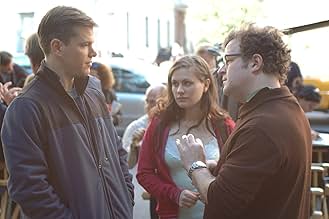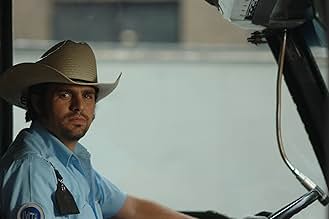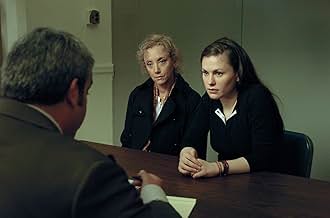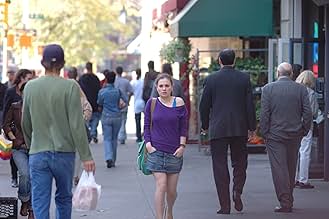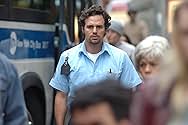VALUTAZIONE IMDb
6,5/10
18.998
LA TUA VALUTAZIONE
Una giovane è testimone di un tragico incidente che coinvolge un autobus e una donna incinta, le cui ramificazioni avranno serie conseguenze sulla vita di molte persone.Una giovane è testimone di un tragico incidente che coinvolge un autobus e una donna incinta, le cui ramificazioni avranno serie conseguenze sulla vita di molte persone.Una giovane è testimone di un tragico incidente che coinvolge un autobus e una donna incinta, le cui ramificazioni avranno serie conseguenze sulla vita di molte persone.
- Regia
- Sceneggiatura
- Star
- Premi
- 10 vittorie e 18 candidature totali
Recensioni in evidenza
Shot back in 2005, after a long history of editing problems, this film finally got released in 2011, and debuted on DVD in 2012, with an extended director's cut (I guess) included. Unfortunately, I accidentally watched the shorter (still two and a half hour) version. I'm not sure I'd want to sit through another half hour of this. It's a good film, at its heart. The story is very good, anyway. My big problem with it is that the central character, played by Anna Paquin, is such an unlikeable, pretentious little snot I eventually just stopped caring about what was going on. It's a totally realistic depiction of a teenager, but it reminds me how much I hate teenagers, or at least teenagers like her. Frankly, most of the rest of the characters are equally as obnoxious. I was extremely glad to see Jeannie Berlin call Paquin out on her bullcrap, but she's just as detestable. I found it hilarious that Paquin mistakenly calls her "strident," which she thinks means "pig-headed" or something but which actually means "shrill." The whole film is honestly pretty shrill. The story revolves around Paquin causing a bus accident. At first, she lies about it, then later she feels bad about it and tries to recant her statement.
"Margaret" took years to get to us, seemingly even longer to play out, but tells a story so poetic and heartbreakingly real that you couldn't imagine it any other way. Lisa (Anna Paquin) is a teenager; she's lost in her own world by her own misguided arrogance, but she must come to terms with death and the true nature of a tragic accident.
The film starts with Lisa in high school determinedly getting her way even though she probably doesn't deserve to. Nonchalantly waiting 'til class is over and wearing a skirt too short, she saunters her way to the front where her math teacher, Mr. Aaron (Matt Damon), chastises her for her poor grades. But with a slightly flirtatious tone, Lisa settles the matter with a supposedly shared understanding that it's okay because math won't factor into her future.
Later, Lisa sets out to find a stylish but functional cowboy hat in the middle of New York City. She is unsuccessful until she spies one on the head of a boyishly handsome bus driver (Mark Ruffalo) and jauntily jogs beside it determined to get his attention to both: find out where he got his hat; and also to quench a teenage girl's desire of just getting his attention. She succeeds; he drives through a red light, and kills a pedestrian in the process.
Lisa immediately feels the pain, guilt and remorse and tries to ease the woman's passage into the afterlife. The film then becomes a character study of a teenage girl determined to get past the pain and aftermath of a tragedy caused by a simple accident. The fascinating parts of this film involve how our lead character becomes less sympathetic but more fragile while remaining equally reckless.
Questions about the cause and nature of mortality are raised, and most interestingly what are the moral and immoral ways to respond to it. The film's title comes from the poem "Spring and Fall: (Margaret, Are You Grieving?)" written by Gerard Manley Hopkins in 1880. Margaret is a child who must come to terms with the loss of her innocence. " And yet you will weep and know why. Now no matter, child, the name; Sorrow's springs are the same." Lisa's English teacher (Matthew Broderick) recites this poem to the class. Lisa is, at times, a typical teenager, bent on having things her way, always having her point heard. But now the shaky foundations which her arrogance is based on begin to crumble and we don't know and she doesn't know if she's still innocent or where she lost it.
The shortened released version of "Margaret" clocks in at over two and a half hours; edited down from the three-hour director's cut. But because of the universal tale of life and death that it tells, it needs the length. It doesn't have a simple plot, and Lisa is not a simple character. It can definitely seem errant with its uneven editing, but that's probably going to be an expected outcome of 6 years' worth of legal and creative battles going on behind the scenes.
Broderick and Ruffalo re-team from Lonergan's previous indie success "You Can Count on Me" (2000), but don't expect any actor to show more range or emotion than Anna Paquin. Everything goes through Lisa.
The film starts with Lisa in high school determinedly getting her way even though she probably doesn't deserve to. Nonchalantly waiting 'til class is over and wearing a skirt too short, she saunters her way to the front where her math teacher, Mr. Aaron (Matt Damon), chastises her for her poor grades. But with a slightly flirtatious tone, Lisa settles the matter with a supposedly shared understanding that it's okay because math won't factor into her future.
Later, Lisa sets out to find a stylish but functional cowboy hat in the middle of New York City. She is unsuccessful until she spies one on the head of a boyishly handsome bus driver (Mark Ruffalo) and jauntily jogs beside it determined to get his attention to both: find out where he got his hat; and also to quench a teenage girl's desire of just getting his attention. She succeeds; he drives through a red light, and kills a pedestrian in the process.
Lisa immediately feels the pain, guilt and remorse and tries to ease the woman's passage into the afterlife. The film then becomes a character study of a teenage girl determined to get past the pain and aftermath of a tragedy caused by a simple accident. The fascinating parts of this film involve how our lead character becomes less sympathetic but more fragile while remaining equally reckless.
Questions about the cause and nature of mortality are raised, and most interestingly what are the moral and immoral ways to respond to it. The film's title comes from the poem "Spring and Fall: (Margaret, Are You Grieving?)" written by Gerard Manley Hopkins in 1880. Margaret is a child who must come to terms with the loss of her innocence. " And yet you will weep and know why. Now no matter, child, the name; Sorrow's springs are the same." Lisa's English teacher (Matthew Broderick) recites this poem to the class. Lisa is, at times, a typical teenager, bent on having things her way, always having her point heard. But now the shaky foundations which her arrogance is based on begin to crumble and we don't know and she doesn't know if she's still innocent or where she lost it.
The shortened released version of "Margaret" clocks in at over two and a half hours; edited down from the three-hour director's cut. But because of the universal tale of life and death that it tells, it needs the length. It doesn't have a simple plot, and Lisa is not a simple character. It can definitely seem errant with its uneven editing, but that's probably going to be an expected outcome of 6 years' worth of legal and creative battles going on behind the scenes.
Broderick and Ruffalo re-team from Lonergan's previous indie success "You Can Count on Me" (2000), but don't expect any actor to show more range or emotion than Anna Paquin. Everything goes through Lisa.
Margaret is a well written coming of age drama, but the protagonist is not a sympathetic character, which is going to alienate a lot of the audience right off the bat. The girl behind me as I left the theater didn't like it, telling her friend, "I just couldn't stand Anna Paquin's character." The screenplay is deft at shorthanding idiosyncratic, complicated personalities with naturalistic dialogue. It also helps that every role in the film, including almost every minor part, is cast with a top notch actor. But for all the big Hollywood names, my props go to J. Smith-Cameron for a theater-grade performance scaled down to fit the intimacy of a close up shot. The movie explores the milieu of affluent teenagers attending an upscale school in New York City, and one of the other reviewers here is right in saying it resembles a French film in that it takes an mature approach to depicting adolescents, showing them as smart, complicated, sexual, uncertain. Most mainstream reviewers seem puzzled as to what they should think about it. I think it's over their heads, the elliptical, dialogue heavy, character driven narrative style, as well as the lack of an easy, simple take-away moral, seems to have befuddled them. Maybe we should rope in some theater critics' opinions instead.
Margaret – CATCH IT (B+) Margaret is very interesting movie about a teenage girl partially involved in woman death in a brutal accident. The movie deals with how she is wants the bus driver to at least accept his mistake too and have some remorse or gilt. The movie takes to her journey how she tries to deal with her conscious. She is now torn apart with frustration and begins to emotionally brutalizing her family, her friends, her teachers, and most of all, herself. Anna Paquin's performance as Margaret is terrific. She literally lived the role. From start to finish you won't be able to take your eyes off her, she may now always be remembered as Sookie Stackhouse but here she shows how incredible emotional range she has as an artist. Alison Janney is her death sequence was amazing. It maybe was a 5mintse scene but she sold her death to us and we can now imagine why Lisa was so heartbroken because of her death. J.Smith-Cameron is superb as Lisa's mom. Mark Ruffalo, Matt Damon, John Gallager JR, Kieran Culkin, Rosemarie DeWitt, Jene Rene and Matthew Broderick did a decent job in their respective small yet pivotal roles. In the end Margaret is a nice movie and only flaw it has is its incredibly long without any reason. The movie could have been easily cut into hour and half by eliminating extra scenes or views of New York City.
On the day of its cinema release, Kenneth Lonergan's long-gestating drama was the most successful film in the UK. Problem was, it only opened on one screen. The story of Margaret's production is likely a fascinating story in itself, not least because of Martin Scorsese and Thelma Schoonmaker's input into the final edit, which was presumably a return favour for Lonergan's work on the screenplay for Gangs of New York. But I'll focus on the fascinating story that Lonergan has told with this film.
Ostensibly the tale centres on a New York schoolgirl named Lisa (Anna Paquin, defining her young adulthood just as she defined herself in childhood with The Piano), who inadvertently causes a fatal road accident. What follows is the emotional aftermath, fought outwardly with her mother, as a moral and ethical war wages within her hormone-ravaged body.
The performances are excellent throughout, particularly Paquin and J. Smith-Cameron as the daughter and mother caught in gravitational flux. Jean Reno gives fine support as the sad-sack Ramon, while Matthew Broderick delivers the poem (by Gerard Manley Hopkins) that provides the film's title, while suggesting the entire life of his character by the way he eats a sandwich. It's that kind of film.
I recently wrote a review of Winter's Bone, which I described as an anti-youth movie. Margaret could be a companion piece in this regard, cautioning against the bright-eyed naivety of youthful independence, and promoting the importance of family. Like Winter's Ree, Lisa is a lost soul; unlike Ree, Lisa is not someone we admire. But she is always in focus; Lonergan expects not for us to like her, only to understand her. In maintaining this focus, Lonergan himself achieves the admirable: weaving a narrative whose minute details and labyrinthine arguments mirror the broader existential vista against which they are dwarfed.
Margaret goes deeper than Winter's Bone, delivering something pleasingly unexpected: a kind of Sartrean modern fable about the isolating nature of subjectivity. Like her actor mother on the stage, and like us all in our semi-waking lives, Lisa is the main player in her great opera. She performs the social functions that enable her to cling to a sense of belongingness, but something gnaws at her soul. And when, after the accident, she seeks some kind of meaning, she is met at once by indifference, before being seduced by those very institutions that make indifference normal. Nothing in the material world satisfies Lisa; nothing can match her aspirations. The suggestion here, I feel, is that our despair emerges from the disparity between that which we hope for and that which reality can deliver.
No wonder it took so long to find its way to a single UK screen: a three-hour existentialist play is a tough sell. Ten years after the towers sank to Ground Zero, Margaret joins There Will Be Blood, The Assassination of Richard Nixon, and (for some) Zodiac in the pantheon of modern classics that map the American psyche in the post-9/11 world.
Ostensibly the tale centres on a New York schoolgirl named Lisa (Anna Paquin, defining her young adulthood just as she defined herself in childhood with The Piano), who inadvertently causes a fatal road accident. What follows is the emotional aftermath, fought outwardly with her mother, as a moral and ethical war wages within her hormone-ravaged body.
The performances are excellent throughout, particularly Paquin and J. Smith-Cameron as the daughter and mother caught in gravitational flux. Jean Reno gives fine support as the sad-sack Ramon, while Matthew Broderick delivers the poem (by Gerard Manley Hopkins) that provides the film's title, while suggesting the entire life of his character by the way he eats a sandwich. It's that kind of film.
I recently wrote a review of Winter's Bone, which I described as an anti-youth movie. Margaret could be a companion piece in this regard, cautioning against the bright-eyed naivety of youthful independence, and promoting the importance of family. Like Winter's Ree, Lisa is a lost soul; unlike Ree, Lisa is not someone we admire. But she is always in focus; Lonergan expects not for us to like her, only to understand her. In maintaining this focus, Lonergan himself achieves the admirable: weaving a narrative whose minute details and labyrinthine arguments mirror the broader existential vista against which they are dwarfed.
Margaret goes deeper than Winter's Bone, delivering something pleasingly unexpected: a kind of Sartrean modern fable about the isolating nature of subjectivity. Like her actor mother on the stage, and like us all in our semi-waking lives, Lisa is the main player in her great opera. She performs the social functions that enable her to cling to a sense of belongingness, but something gnaws at her soul. And when, after the accident, she seeks some kind of meaning, she is met at once by indifference, before being seduced by those very institutions that make indifference normal. Nothing in the material world satisfies Lisa; nothing can match her aspirations. The suggestion here, I feel, is that our despair emerges from the disparity between that which we hope for and that which reality can deliver.
No wonder it took so long to find its way to a single UK screen: a three-hour existentialist play is a tough sell. Ten years after the towers sank to Ground Zero, Margaret joins There Will Be Blood, The Assassination of Richard Nixon, and (for some) Zodiac in the pantheon of modern classics that map the American psyche in the post-9/11 world.
Lo sapevi?
- QuizOriginally scheduled for release in 2007, but writer/director Kenneth Lonergan spent four more years struggling with Fox Searchlight Pictures over the final cut, resulting in several lawsuits.
- BlooperWhen Lisa comes home after the accident, throws up and hugs her mother, there's no blood on her arms and hands. In the next shots under the shower, there is plenty.
- Versioni alternativeExtended version released on DVD runs for 178 minutes.
- ConnessioniFeatured in Maltin on Movies: Ice Age: Continental Drift (2012)
I più visti
Accedi per valutare e creare un elenco di titoli salvati per ottenere consigli personalizzati
Dettagli
Botteghino
- Budget
- 14.000.000 USD (previsto)
- Lordo Stati Uniti e Canada
- 46.495 USD
- Fine settimana di apertura Stati Uniti e Canada
- 7525 USD
- 2 ott 2011
- Lordo in tutto il mondo
- 469.264 USD
- Tempo di esecuzione
- 2h 30min(150 min)
- Colore
- Mix di suoni
- Proporzioni
- 1.85 : 1
Contribuisci a questa pagina
Suggerisci una modifica o aggiungi i contenuti mancanti




